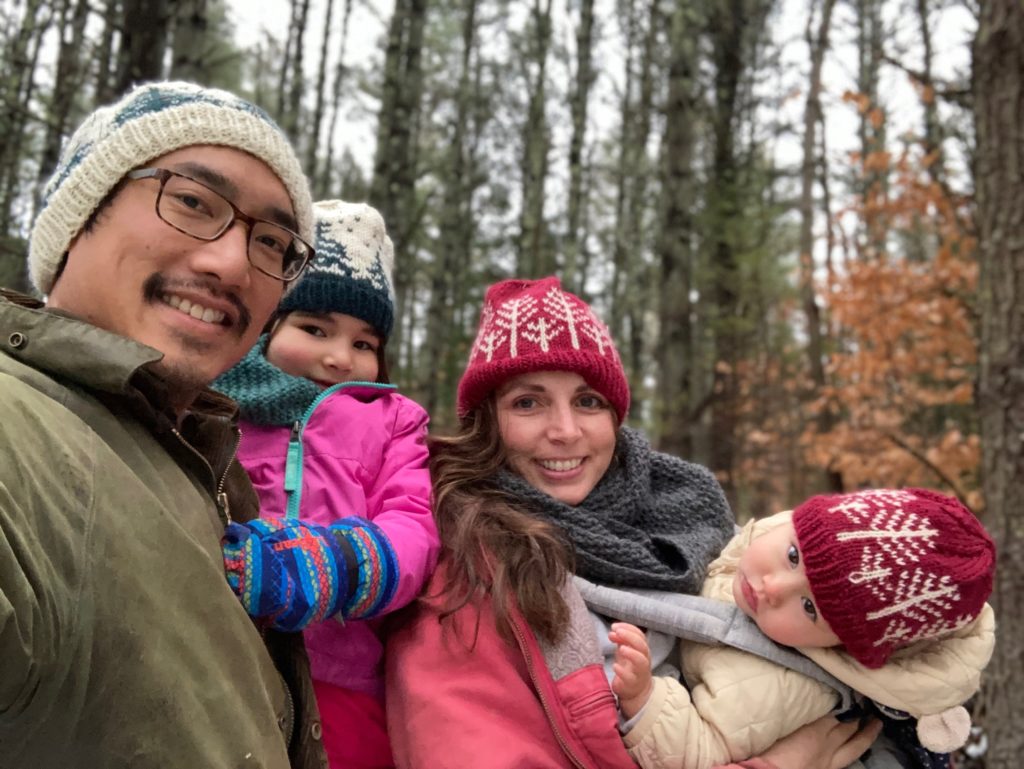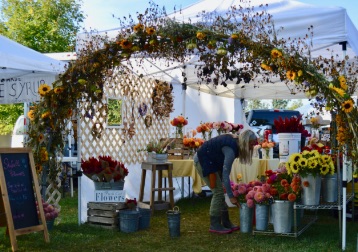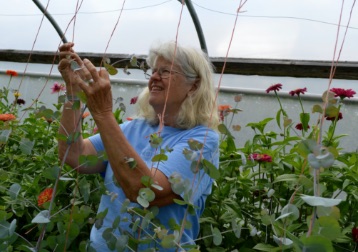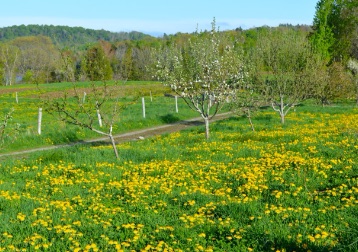Tender Soles Farm
FULL FOR THE 2024 SEASON. Our farm is located on Main St. in Richmond, a few miles from downtown Richmond and a few miles from Interstate 295. Richmond has a population of about 3,500, similar in size to its neighboring towns. We are a little less than an hour north from Portland, 20 minutes south of Augusta. Richmond, like most of the surrounding towns, was originally the land of the Abenaki people.

Early to mid-March to mid-November. Minimum of 6 months. We potentially will have part-time work through
the winter.
We are a vegetable, herb, and flower farm located on Main St. in Richmond since January of 2015, a few miles from downtown Richmond and a few miles from Interstate 295. Richmond has a population of about 3,500, similar in size to its neighboring towns. We are a little less than an hour north of Portland and 20 minutes south of Augusta. Richmond, like most of the surrounding towns, was originally the land of the Abenaki people.
Although the town of Richmond is small and largely rural, it offers waterfront on the Kennebec River, with barge access and camping on Swan Island, a boat ramp, three restaurants, a library, a Town Forest, a small grocery store, four hair salons, a hardware store, art gallery, and more. Richmond has its own K-12 schools and we strive to contribute to our local schools as much as we can with educational opportunities, on-farm visits, and gardening advice for their recently created raised garden beds.
Our property is 45 acres. We have 3.5 acres of no-till vegetable and flower land, a 1 acre orchard, a planting of high bush blueberries, approximately 10 acres of open pasture/wetland, and 30 acres of woodland that we manage with our draft horses for firewood and lumber for on-farm projects.
We encourage apprentices to get out and explore our surrounding area on evenings and weekends. We can help facilitate gatherings with other apprentices in the area.
Our main products are vegetables, flowers and seedlings, and lactofermented vegetable products (kimchi, sauerkraut, takuan). We sell these through several different venues:
Farm Stand
Box Summer CSA
Box Winter CSA
Flower CSA
Yarmouth Farmers’ Market
Bowdoinham Farmers Market
Brunswick Farmers Market
Seedling Sales
Wholesale
We were primarily a horse powered farm; we recently lost one of our horses to old age. We see the farm as a part of a solar-driven economy as opposed to fossil fuel driven. During the summer we rotate the horses on pasture while the grass is growing. The grass forage we harvest for the horses is one of nature’s simplest and time-tested solar collectors. As growers and stewards of the land, we view our role on the farm as managers of both the soil and the solar harvesters we call plants. We value growing food at a small, human scale so while we value efficiency and scale, we also appreciate the value of physical labor as we operate as a primarily human-powered farm when it comes to our growing system.
The horses have established our crop fields since 2015 and have been converted into a no-till deep compost system since 2022. We do not own a tractor although we do borrow the neighbor’s for various tasks. We cultivate between 1-2 acres a year in vegetables and flowers in addition to two tunnels keeping in mind we are trying to minimize our use of nonrenewable materials on our farm (i.e. plastic). We have a very small apple orchard and are currently establishing high bush blueberries and perennial flowers.
We also process and sell fermented vegetable products as a way to reduce on-farm vegetable waste and create value-added products. Our ferments include 3 types of kimchi, 2 types of sauerkraut, and a daikon ferment all made primarily with our produce, but supplemented with other local, organic farms’ produce andMaine Sea Salt.
We are MOFGA certified organic.
Because we are a small farm, apprentices will participate in most of the tasks required on our farm, from planting seeds, to harvest, to marketing. Apprentices will:
Learn seedling propagation – seeding all crops needed for use on the farm and for seedling sales: vegetables, herbs flowers. Includes seedling house organization, upkeep, climate control, timing of seeding crop successions, etc.
Learn specifics for harvesting all crops grown on our farm including flowers and herbs, as well as specific handling instructions for wash/pack for each type of crop and type of sales outlet.
Learn our parameters for being able to accomplish many tasks so that they can do those tasks unattended when need be.
If interested, learn some of the skills required to manage a farm including planting schedules, budgeting, cash flow, managing inventory, and more.
Participate in farmers’ markets and the process leading up to and after markets.
Learn basic modern carpentry and building skills
Learn minimal input practices such as mulching, composting, and cover cropping
Participate in draft horse care and management. Most of this will be maintenance tasks such as mucking out the horse shed, feeding, moving pasture, etc. If there is significant interest in the horses, we can devote time to the specifics of driving as well as general horse care and maintenance.
Valid drivers license and your own vehicle.
Provide us with at least 2 references: at least 1 previous employer and 1 personal.
Enjoy a long day outside in the hot sun or pouring rain.
Ability to lift 40 pounds.
Social skills to be able to interact with customers at the farm stand and farmers’ markets (patience and interest in educating customers on our particular farm practices and answering questions about products).
Attention to detail.
A capacity to keep yourself engaged and aware of an evolving and expanding role on the farm.
A capacity to do repetitive tasks at times; sometimes alone.
Ability to follow directions and to ask for direction when more input is needed.
Ability to live in a small space by yourself with few ‘modern’ amenities (a cabin on the edge of our property).
A capacity for nonviolent communication.
A passion for living close to the land and in a small rural community
A passion for self-care and a plan to support your body throughout a season of hard physical labor and a mental health support plan during a season of farm work
Prior experience on a commercial vegetable farm preferred.
A natural curiosity and valuing your own time. You are expecting to learn in your time here and there are lots of different things you will be learning in addition to us learning about each other. We will try our best to meet your expectations for learning from your experience with us, but we also expect you to ask questions; especially if something isn’t clear. We feel that a person who asks questions about processes and the work they are
doing is generally more invested in the goals we are trying to accomplish as a team.
Good work ethic and grit. There will be times when your patience, body, and attention will be tested by farm work. We take satisfaction in sometimes solving and pushing through adversity to accomplish a satisfactory goal.
Apprentices will be expected to work 5 nine hour days, Monday-Friday.
Ability to enjoy both independent and team work based activities.
Ability to comprehend your role in “the bigger picture” of the farm and envision how you can keep the ball rolling throughout the season.
Non-farm expectations will include cleaning and maintenance of shared living spaces. We will have a chore wheel for this.
No Pets.
We look forward to hiring apprentices that we enjoy spending time with, but we try to have some private family time on the weekends and expect apprentices to be independent.
We will spend many hours with our apprentices training them on how to do various farm activities in a productive, efficient way. We will focus on education, safety, and comfort for each individual – we know that individuals have different preferred learning modes and will work with people to make sure we provide multiple forms of information: written, visual, audio, etc. Ultimately a lot of farm work is “learning by doing” and learning from mistakes.
We will have the apprentice set specific goals for things they want to learn during their time with us with measurable outcomes to mark progress.
We will have a quick Monday Morning Meeting to go over the week’s activities and check-in as a team. We will also have a meeting once a month to see how we are progressing on meeting the personal work goals of the apprentice.
Apprentices are encouraged to attend MOFGA farm education events, particularly those geared towards apprentices.
We can facilitate setting up farm tours at other Maine farms that the apprentice may be interested in visiting.
We have many books on organic farming, farming with horses, livestock care, flowers, and herbal remedies we encourage apprentices to borrow at their leisure.
Rich and Kate are both full-time on the farm in the summer, and they both work part-time off the farm December-March. Rich is a carpenter in the off-season.
We will mostly, but not always be working alongside our apprentice on a daily basis. As much as possible we try to front load learning of tasks early in the year. We expect that as the season progresses, the apprentice will be able to take on more responsibility and gain confidence in their tasks and roles on their farm as we feel more comfortable working with each other and on the farm.
Apprentices will be paid a $700 work stipend every two weeks and a $100 monthly credit of farm stand products. Of course you get all the vegetables you would like from the farm! We will provide a mid-season (depending on farm finances) and end of season bonus (no matter what). We also try to grow enough dry beans for ourselves and apprentices.
Yes, On-farm
Housing: We have 2 small cabins set at the back of our fields near the woods, a 5-minute walk from our house. No electricity, running water, or WiFi at the cabin, but you do have access to amenities in our house such as: washer/dryer, oven, and shower. We have two young children so expect little activity at the farmhouse after 7pm.
One cabin is 4 season (insulated and heated with a wood stove, camp stove for cooking, and a foot pump sink for water use).
We have a second cabin that will be unheated and primarily for living space and resting.
We have a couple of crew lunches together every week and take turns making the meal on farm time. We can accommodate dietary restrictions as needed.
Cabin Amenities:
Outhouse
Outdoor shower
Illegal drugs are not permitted on our property. No one is allowed to use drugs or alcohol while on the job or to show up to work intoxicated.
We believe that a visit would be in the highest interest of both parties; however have had great experiences interviewing over Zoom if it’s not feasible. We consider the first 2 weeks of the apprenticeship a trial period after which we have a check-in to see if both parties feel we are a good fit.
We have a Farm Employees Manual. We will take time the first day of the apprentice’s arrival to the season to go over the employee handbook, all expectations, as well as give an extensive farm and house tour.
We will have a brief weekly meeting every Monday morning with all employees to go over the week’s schedule and check-in on each individual’s outlook for the week.
We will give written notice of disciplinary action if the need should arise. We will fire an apprentice if the need arises. If an apprentice decides they want to leave our farm we request 2 weeks notice.
Apprentices are given 5 paid sick days to use throughout their time with us. If an individual needs more than 5 sick days within the season we will discuss how this might affect compensation on an individual basis.
Kate grew up in Whitefield, Maine and Rich is from Queens, NYC. We are both in our mid-30s and have two small children. We value quality time with our family and friends and strive to be good stewards of the 45 acres of land we live on.
We view our role on our farm is to be stewards of the land. We want to leave the land in a better state than when we started. We treat our farm as part of a whole, renewable system tied into the greater environment, not a mode of extraction for us to consume. Of course we’re not perfect and have to balance this with economic viability within a capitalist economic system.
We are using the sun’s energy to feed us and the ecosystem we live in. Our general philosophy is “enough for later” rather than “more now” and the more local, the better. We can’t afford to continue to ship calories and materials vast distances to support us. Our lasting legacy will be better lives for present and future generations.
Conflict is a natural part of human existence. We strive to create an atmosphere where people won’t be afraid to say what they believe and that dialogue (and specifically listening to others to actually hear what they have to share) and nonviolent communication are the keys to diminishing confrontation and divisiveness. However, we will not tolerate any sexist/bigoted/racist/bullying behavior.
Former Apprentice
Daniel Tiedtke, [email protected], 781-206-4206.
Former Apprentice
Tony Keyes, [email protected], 207-522-8279.
Friend
Jessie Spector, [email protected], 413-250-6666.



Tender Soles Farm
- Physical Address
-
453 Main Street
Richmond, ME 04357
- Phone
- 917-887-9702

